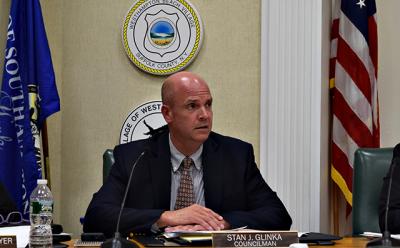Southampton Town Board Ponders Uber

A hearing on proposed changes to Southampton Town’s taxi legislation that would require Uber drivers to obtain the same licenses required of traditional cab companies and drivers received support from local drivers on Tuesday night. However, the board decided to keep the hearing open another two weeks to allow Uber to finalize a proposal of its own.
Councilman Stan Glinka, who sponsored the legislation, has said it is meant to level the playing field. For example, the current town code only regulates taxis that wait for fares outside clubs or at train stations. It requires the annual registration of cab companies, cab drivers, and the cabs themselves, but vehicles that pick up prearranged fares, such as Uber’s nationwide ride-sharing service, have been exempt. Mr. Glinka began looking into the issue last summer when complaints flooded Town Hall about Uber drivers soliciting business on the streets. Some drivers, only here for the weekend, could be found sleeping in their cars between fares.
Under the proposed changes, livery vehicles, defined as any vehicle picking up a passenger for a prearranged trip, would be subject to licensing. Like cab companies and drivers, livery business owners would pay $750 for a town license, $150 per car, and $100 per driver. Given Uber’s business model, in which cars are owned and operated by independent drivers affiliated with but not employed by the company, each individual driver would pay $1,000 for all three of the permitting fees to operate legally in the Town of Southampton.
The only differences between taxis and liveries are that liveries do not need to have the taxi license plates issued by the Department of Motor Vehicles, nor must they prominently identify themselves, as cabs must. Uber drivers, therefore, could continue to operate in unmarked cars.
Uber emailed its Southampton customers earlier this month saying that “new rules could prevent Uber driver-partners from operating in your town and take away your ability to get a reliable ride at the tap of a button.” Uber called the additional licenses that Southampton would require of its drivers under the proposal “unnecessary and expensive bureaucratic requirements.” The company urged customers to call the supervisor’s office.
After the board set a public hearing on Mr. Glinka’s proposed amendments, Uber management requested a meeting with him. Uber said it could stop its drivers from waiting for fares on the street or in front of restaurants and night clubs, and that it would ban any activity that was not pre-arranged through the ride-sharing app. The company could guarantee, it said, that the vehicles and those operating them were licensed, fingerprinted, and screened by the New York City Taxi and Limousine Commission.
Uber drivers must also take a physical exam, a three-day class and test on for-hire vehicle driving, and an annual drug test.
“Drivers who partner with Uber in New York already go through an extensive process. We are hopeful that Southampton officials will recognize this,” an Uber spokesperson said yesterday. “The town has raised several valid issues and, given a mutual understanding, we are eager to come to a solution that works for everyone.”
While Mr. Glinka said he was considering Uber’s proposal, he has yet to see an agreement that would be legally binding. “At this time, I have no intention of abandoning this legislation, but believe it is smart to evaluate all options,” he said at Tuesday’s meeting.
Speakers who were there supported the proposal, and some wanted to see it go even further. David Baz, who said he has been driving with Uber for three years and recently moved to Southampton, was among the supporters. He said there were too many vehicles for hire on the road, and called for a cap on the number of licenses issued, with local residents receiving them first.
“If I’m going to be paying all those things, I need kind of protection,” he told the board. “It’s like when you open a pizzeria in a strip mall, you don’t want another pizzeria right next store or right across the street.” After some tweaking, the latest proposal exempts limousines from having to comply with licensing the way that taxis and liveries would have to, by amending the definition of a limo. Under town code, it would mean any vehicle operating with a contract, such as for a wedding, funeral, or prom.
In another change since the proposal was first discussed in February, drivers who have already undergone background checks and fingerprinting with the newly formed Suffolk Taxi and Limousine Commission would not have to undergo the same check with the town. Carl Benincasa, an assistant town attorney, said the town had received assurances that the county will notify it of any changes to the driver’s record.
The hearing will be continued on April 12 at 1 p.m.
